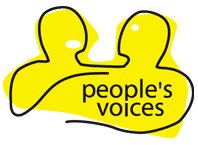What Is Advocacy
At People's Voices, our advocacy partners are people with learning difficulties, physical disabilities, sensory impairment, mental health service users and older people. Our advocates take the advocacy partners' side, listen to them and help them ask for what they want. Download a pdf of our leaflet here. Advocacy promotes equality, social justice and social inclusion. It aims to empower people to speak up for themselves. Advocacy can help people become more aware of their own rights, to exercise those rights and be involved in and influence decisions that are being made about their future. Our advocates encourage and support their partners to speak up for themselves. Where the advocate speaks on the partner's behalf, they do so without imposing their own views. At all times, advocates respect the confidentiality of their advocacy partners. An advocate needs to have good verbal and listening skills, a commitment to helping people, and to be both reliable and able to maintain confidentiality. An advocate's role is to represent the advocacy partner. The role is different from that of befrienders, people who give advice, or offer mediation services. We offer comprehensive training courses, regular meetings and on-going support from the Advocacy Support Manager. Read more about becoming a Volunteer Advocate. Most of our advocacy partners are supported because they have asked for an advocate to help them, or an agency has done so on their behalf and they have agreed that they would like help. People's Voices will provide an advocate where we have the resources to do so. In some instances, there is a statutory entitlement to an advocate: Independent Mental Health Advocates (IMHAs) are specialist advocates who are trained to work within the framework of the Mental Health Act 1983. IMHAs are completely independent of any person or service that is involved with the patient's treatment or care, and provide their services free of charge. Mental Health service users may be entitled to an IMHA. Independent Mental Capacity Advocates (IMCAs) are specialist advocates who work alongside the Mental Capacity Act. The Mental Capacity Act 2005 provides a statutory framework for acting and making decisions on behalf of individuals who lack the mental capacity to do so for themselves. This may be because of a learning disability, an illness such as dementia or brain injury or mental health problems. It sets out who can take decisions, in which situations, and how they should go about this. General information about the IMCA service (PDF). |



 What is Advocacy
What is Advocacy Advocacy is taking action to help people:
Advocacy is taking action to help people: